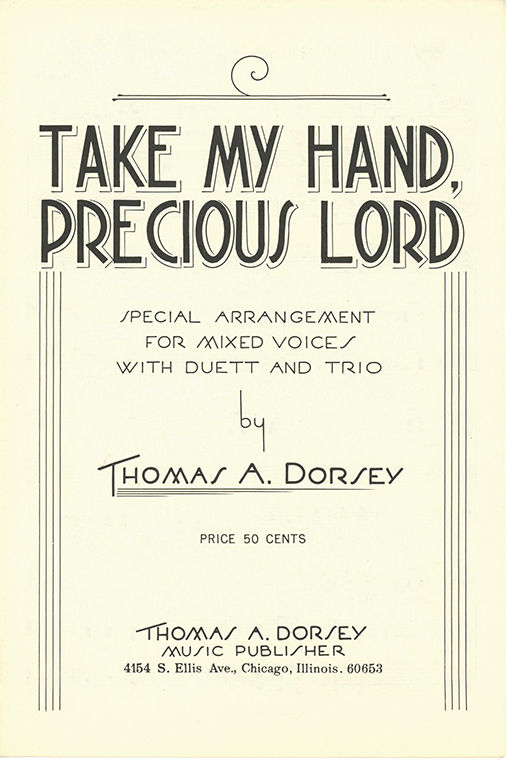Cultural Center belts out gospel
A song book featuring Thomas A. Dorsey’s popular song Take My Hand, Precious Lord.
April 20, 2015
Chicago’s music history spans many decades and multiple genres. “Chicago’s Gospel Truths,” an exhibit at the Chicago Cultural Center, 78 E. Washington St., opened April 15 and focuses on the lesser-known but prominent history of modern gospel music in the city.
“Chicago’s Gospel Truths” consists entirely of the personal collection of Tim Samuelson, the city of Chicago’s officiall cultural historian and a long-time gospel music fan. The exhibit features photographs, leaflets, sheet music and original vinyl pressings of the music from Thomas A. Dorsey, the father of gospel, along with works from Mahalia Jackson and Roberta Martin, who both helped popularize the genre.
Samuelson said Dorsey was originally a blues musician who performed in cabarets on Chicago’s South Side during the 1920s under the name Georgia Tom but would eventually shift to a more religiously oriented style in the 1930s after losing his wife and child during childbirth. Samuelson said it was in the 1930s when Dorsey’s music incorporated religious subjects alongside the popular styles of jazz and blues.
“[Dorsey] was experimenting with taking what would be the very emotional power of jazz and the blues—which he performed with such success in the cabarets and on his records—and adapted many of those characteristics toward the ideas of reverence and stirring passion and religious devotion,” Samuelson said.
Samuelson said Dorsey was met with resistance when introducing his new spiritual music to local congregations, a reception common to many new forms of music
“[Dorsey] would take the music to churches and demonstrate it,” Samuelson said. “They would hear these riffs that came from jazz and the blues and Dorsey was told to get out.”
Dorsey’s modern gospel would eventually become popular within churches and achieve commercial success. Charsie Sawyer, director of vocal studies at Calvin College in Grand Rapids, Michigan, as well as the conductor of the school’s gospel choir, said multiple forms of gospel subgenres exist today, but the original message behind the music remains no matter what shape the genre takes.
“Now we have so many specific genres of gospel,” Sawyer said. “Gospel music has morphed into gospel jazz, gospel contemporary … it has its roots in a lot of different genres, but when we think about gospel music it can [stylistically] be a way of singing and it can be whatever one sings in that particular style, but it has to have something related to the good news of Jesus Christ.”
Apart from its message, gospel music is also known for the technical talent that its singers possess. Sawyer said gospel singers have to gain the skill by practicing because the subtle nuances of the gospel style are surprisingly difficult to master.
“Some things can be written, but some things have to be taught,” Sawyer said. “Even if gospel music can be written, it may not have all of the nuances, some of the inflections, just like jazz with the improvisation that goes along with it, it cannot be written. It has to be taught.”
Feranda Williamson is the president and CEO of the Chicago Mass Choir, a local gospel choir that has been performing for 25 years. Williamson said gospel music’s message transcends ethnic, cultural and language barriers—a quality that allows the choir to perform around the world.
“When we tour abroad, our audience may not always understand the language, but they feel our heart,” Williamson said. “The spirit that goes along with it is so important. It’s a way to share hope and encouragement to God’s people through the music of gospel.”
Williamson said even 80 years after Dorsey created what would become modern gospel, Chicago is still deserving of the title of the home of gospel music and themusic is still alive and well in the cit.y
“[Chicago] is the home of gospel music because we’ve had Thomas Dorsey, the father of gospel music, Roberta Martin and different earlier groups [who] actually got their start in Chicago,” Williamson said. “There’s a wealth of great gospel music here [in Chicago]. On any given Sunday you can go to a small or large church where you’ll hear phenomenal gospel music—South Side, North Side, East and West [sides]—in any community you’ll be able to experience phenomenal gospel music, so I definitely believe Chicago is, has been and will continue to be the home of gospel.”








